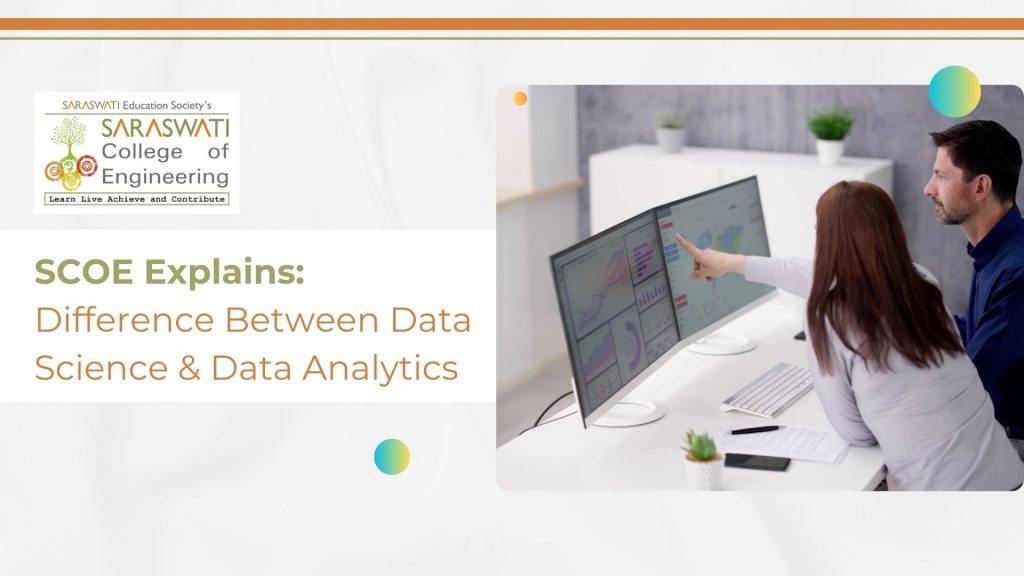SCOE Explains: Difference Between Data Science & Data Analytics

Introduction
The Rise of Data-Driven Decision Making
The digital world has changed the way organizations used to function. Now they depend on data to drive business strategies, optimize operations, and improve customer experiences. This transformation has led to the emergence of two big giants in the data field: Data Science and Data Analytics. They are a good career option for the students.
Purpose of the Article
This article is designed to demonstrate the difference between data science and data analytics, which will help students decide if they want to move forward and pursue them as a career choice. This guide is loaded with all the essential information regarding salary, industrial applications, or educational pathways related to these fields.
What is the Difference Between Data Science and Data Analytics?
What is Data Science?
Data Science is a multidisciplinary field that combines statistics, machine learning, and big data processing. It focuses on developing predictive models, AI-driven applications, and automation tools to analyze large datasets and extract meaningful insights.
What is Data Analytics?
Data Analytics, on the other hand, is more focused on analyzing historical data to find trends, patterns, and actionable business insights. It uses business intelligence tools, statistical analysis, and reporting to guide decision-making.
Core Differences Between Data Science and Data Analytics
| Factor | Data Science | Data Analytics |
| Objective & Approach | Focuses on asking broad questions and developing new methodologies | Focuses on answering specific business questions with structured data |
| Tools & Technologies | Python, R, TensorFlow, Hadoop, Spark | Excel, SQL, Tableau, Power BI |
| Outcome & Application | Develops predictive models for future insights | Provides actionable insights from past data |
Examples of Data Science and Data Analytics in Action
- AI-powered recommendation systems (Data Science) vs. trend-based product sales forecasting (Data Analytics)
- Fraud detection in banking (Data Science) vs. customer transaction analysis for insights (Data Analytics)
Which is Better: Data Science or Data Analytics?
Career Suitability
Choose Data Science if you:
- Enjoy coding, AI, and machine learning
- Want to develop AI-driven solutions and predictive models
- Prefer working with unstructured and large-scale data
- Aim to work in research, automation, or deep learning
Choose Data Analytics if you:
- Prefer statistical analysis and business intelligence
- Want to derive actionable insights from structured data
- Enjoy working with SQL, Excel, and visualization tools
- Aim to work in business strategy, finance, or marketing
Industry Demand for Both Fields
| Industry | Data Science | Data Analytics |
| AI & Robotics | ✔ | ✖ |
| Healthcare | ✔ | ✔ |
| Finance | ✔ | ✔ |
| Marketing | ✖ | ✔ |
| Cybersecurity | ✔ | ✖ |
What is the Salary Difference Between Data Science and Data Analytics?
Global and Indian Salary Comparisons
| Role | USA Salary (Annual) | India Salary (Annual) |
| Data Scientist | $100,000+ | ₹10-20 LPA |
| Data Analyst | $60,000+ | ₹5-12 LPA |
Factors Influencing Salary Differences
- Industry demand
- Experience level
- Technical expertise and certifications
Data Science vs. Data Analytics: Career Scope and Educational Pathways
Education and Qualifications
| Criteria | Data Science | Data Analytics |
| Degree Requirements | Master’s/Ph.D. in AI, ML, Statistics, or Computer Science | Bachelor’s in Mathematics, Statistics, or Business Analytics |
| Certifications | AI, Deep Learning, Big Data | SQL, Tableau, Excel, Business Intelligence |
Job Roles and Responsibilities
Data Science Job Roles & Responsibilities
| Job Role | Key Responsibilities |
| Data Scientist | Develop machine learning models, analyze large datasets, and create predictive analytics solutions. |
| Machine Learning Engineer | Design and deploy AI-driven systems, optimize algorithms, and work with deep learning frameworks. |
| AI Engineer | Build AI applications, automate processes, and improve decision-making with AI models. |
| Big Data Engineer | Manage and process large-scale data using Hadoop, Spark, and cloud-based platforms. |
| Research Scientist | Conduct AI and data research, develop new algorithms, and enhance deep learning techniques. |
Data Analytics Job Roles & Responsibilities
| Job Role | Key Responsibilities |
| Data Analyst | Analyze structured data, create dashboards, and generate business insights using SQL and Excel. |
| Business Intelligence Analyst | Develop reports, visualize data trends, and support strategic decision-making. |
| Marketing Analyst | Track customer behavior, optimize marketing campaigns, and analyze business performance. |
| Financial Analyst | Assess market trends, perform risk analysis, and provide financial forecasting. |
| Operations Analyst | Improve business processes, optimize efficiency, and reduce operational costs using data. |
Skills Required for Data Science and Data Analytics
Whether you choose to pursue data science or data analytics, there are several key skills you will need to succeed in either field:
- Programming: Both data scientists and data analysts need to be proficient in languages like Python, R, and SQL.
- Mathematics and Statistics: A solid foundation in statistics is crucial for both fields.
- Data Visualization: The ability to visualize data using tools like Tableau or Power BI is essential, especially for data analysts.
- Machine Learning (For Data Scientists): Data scientists must deeply understand machine learning algorithms and their applications.
- Business Acumen: Whether you are a data scientist or data analyst, you need to understand the business context in which you work.
These skills are covered extensively in SCOE’s data science and data analytics courses, ensuring students are well-prepared for the competitive job market.
Similarities Between Data Science & Data Analytics
Data Science and Data Analytics share several similarities, as both fields focus on extracting meaningful insights from data using statistical and analytical techniques. They rely on programming languages like Python, R, and SQL for data manipulation, and both utilize data visualization tools such as Tableau and Power BI to aid decision-making. Professionals in both domains work with large datasets, applying mathematical and statistical models to analyze trends and patterns. Additionally, they contribute to improving business processes by enabling data-driven strategies and optimizations. While their applications may differ, they often overlap in job roles, requiring a blend of technical and analytical skills.
Placement and Internship Opportunities at SCOE
Saraswati College of Engineering (SCOE) provides industry-aligned training and internship opportunities to prepare students for careers in Data Science.
Why Choose SCOE for Data Science?
- NAAC A+ Accreditation & NBA Accreditation
- State-of-the-art labs and research facilities
- Internships and live projects with top recruiters
- Strong placement support with top-tier salaries
Conclusion
Summarizing the Key Differences
- Data Science is about developing AI-driven solutions and predictive models.
- Data Analytics focuses on interpreting historical data for business insights.
Making an Informed Career Choice
Choosing between Data Science and Data Analytics depends on your interests, skillsets, and career aspirations. Both fields offer promising opportunities in the modern data-driven economy.
Frequently Asked Questions (FAQs)
What is the difference between DA and DS?
- DA (Data Analytics) focuses on processing and interpreting past data.
- DS (Data Science) involves building AI models and predictive analytics.
Which is better: Data Science or Data Analytics?
- Data Science is ideal for those interested in AI, machine learning, and automation.
- Data Analytics suits those focused on business intelligence and statistical analysis.
What is the salary difference between Data Science and Data Analytics?
- Data Scientists earn higher salaries due to AI expertise and demand.
- Data Analysts earn competitive salaries but generally lower than Data Scientists.
Can a Data Analyst become a Data Scientist?
Yes! With additional skills in machine learning, AI, and advanced programming, a Data Analyst can transition to Data Science.
Difference between Data Science and Data Analytics with example?
Example: Predicting customer behavior (Data Science) vs. analyzing past customer transactions (Data Analytics).


